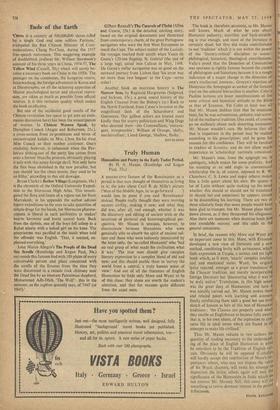Ends of the Earth
'CRINA is a country of 500,000,000 slaves ruled by a single God and nine million Puritans,' trumpeted the Red Chinese Minister of Com- munications, Chang Po-Chun, during the 1957 free-speech movement. This staggering example of doublethink prefaces Mr. William Stevenson's account of his three years in China, 1954-57, The Yellow Wind (Cassell, 30s.) which will surely be- come a necessary book on China in the 1950s. The passages on the communes, the kangaroo courts, brainwashing, the foreign adventures in Korea and at Dienbienphu, on all the sickening apparatus of Maoist psychological terror and physical repres- sion, are taken as much as possible from official sources, It is this verbatim quality which makes the book so effective.
But one of the incidental good results of the Chinese revolution (no space to get into an ends- means discussion here) has been the emancipation of women. In Chinese Women Speak, by Dymphna Cusack (Angus and Robertson, 21s.), a cross-section from ex-prostitutes and wives of reconstructed kulaks to Mrs. Chou En-lai treat Miss Cusack as their mother confessor. One's credulity, however, is exhausted when the Pav- lovian dishing-out of the party line comes from even a former Manchu princess, obviously playing it safe with this nosey foreign devil. Not only have the flies been abolished in the new paradise, but you should 'see the clean streets, they used to be so filthy,' according to this old dowager.
Bryan Clarke's Berber Village (Longmans, 18s.) is the chronicle of the Oxford University Expedi- tion to the Moroccan High Atlas. This investi- gated the flora and fauna of a region not far from Marrakesh; in his appendix the author advises future expeditions to the area to take quantities of simple drugs for the locals, for Moroccan pharma- copoeia is liberal in such antibiotics as snakes' hearts, 'kerosene and burnt animal horn. Back from the djebels, one of the boys fell asleep in a Rabat niterie with a naked girl on his knee. The proprietress was pacified at the insult when told the offender was English. 'That, it seemed, ex- plained everything.'
John Marco Allegro's The People of the Dead Sea Scrolls (Routledge and Kegan Paul, 30s.) surrounds this famous find with 189 plates of every conceivable person and place concerned with the scrolls of the Essenes from the time they were discovered in a remote rock chimney near the Dead Sea by an itinerant Palestinian shepherd, Muhammad Adh-Dhib, 'The Wolf': this in the summer, as the caption quaintly says, of '1947 (or 1945).'
Gilbert Renault's The 'Caravels of Christ (Allen and Unwin, 25s.) is the detailed, exciting story, based on the original documents and illustrated from contemporary charts, of the great Portuguese navigators who were the first West Europeans to reach the Cape. The subject matter of the Lusiads, the voyages reached their zenith when Vasco da Gama's 120-ton flagship, St. Gabriel (the size of a large tug), sailed into Calicut in May, 1498. Da Gama's stellar navigation was so good on the outward journey from Lisbon that 'his error was no more than two leagues' at the Cape—seven miles!
Another book on maritime history is The Narrow Seas, by Reginald Hargreaves (Sidgwick and Jackson, 45s.), a good, sound history of the English Channel from the Bishop's (sic) Rock to the North Foreland, from Caesar's invasion to the magnificent dash of the Scharnhorst and Gneisenau. Our gallant sailors are treated more kindly than the scurvy politicians and Whig Dogs who directed them—the Cromwellians, 'extrava- gant, irresponsible'; William of Orange, 'shifty, machiavellian'; Lloyd George, 'shallow, flashy.'
DAVID REES






































 Previous page
Previous page